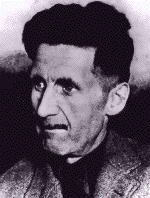
Political language ... is designed to make lies sound truthful and murder respectable, and to give an appearance of solidity to pure wind.1
—George Orwell
Eric Arthur Blair, known to the world as George Orwell (1903-1950), was a "socialist" who found himself unable to long abide any actual socialist party or regime.
Orwell was never able to disentangle the contradictions at the heart of his political passions. He could not conceive of a just world that was not socialist, but he also grasped that socialism seems to require a ruthless state to impose it, buying "social justice" at the price of liberty.
Unlike most on the Left—who either embrace totalitarianism or simply evade the logic of their own position—Orwell's intellectual honesty compelled him to spend his life banging his head against his perceived moral dilemma. The products of that struggle include some powerful writing, notably his last work, 1984.
This great horror-satire has suffered the ironic and near-fatal indignity of being made a compulsory text in our government schools, imposed by the uncomprehending upon the uninterested. That a state rapidly evolving into the Big Brother Orwell feared should so blandly canonize his cri de coeur is the clearest possible indication that the book itself is now safely unintelligible to both teachers and the taught. But there will always be a few who do Get It.
Orwell's anguished integrity was perhaps most manifest when he found himself obliged to defend objective truth itself—which, in the end, he would not surrender to any party, even his own.
"The really frightening thing about totalitarianism," he wrote, "is not that it commits 'atrocities' but that it attacks the concept of objective truth: it claims to control the past as well as the future."2 In 1984 the insight would be whittled down to this succinct maxim: "Freedom is the freedom to say that two plus two make four. If that is granted all else follows."3
Yoked to Orwell's reverence for truth was his insistence on good writing. Truth-seeking requires clarity of thought, and this, he said, is impossible without clarity of language. Anyone who attempts to write or think clearly about anything could benefit from reading his essay "Politics and the English Language"
When language is sufficiently corrupted, whether by the collective indifference of its users or as a deliberate policy, as in 1984's "Newspeak," the result is the same, an "instrument of reason" that can no longer support reason, in which "doublethink" eclipses the law of non-contradiction:
"To know and not to know, to be conscious of complete truthfulness while telling carefully constructed lies, to hold simultaneously two opinions which cancelled out, knowing them to be contradictory and believing in both of them, to use logic against logic, to repudiate morality while laying claim to it ...—that was the ultimate subtlety: consciously to induce unconsciousness, and then, once again, to become unconscious of the act of hypnosis you had just performed. Even to understand the word 'doublethink' involved the use of doublethink."4
Or, as Ayn Rand might say: "blank-out." The lowest circle of her hell was assigned to those who evaded the responsibility of rational thought. George Orwell felt and brilliantly expressed that same visceral revulsion. He saw that doublethink qua doublethink was the necessary and primary horror at the base of totalitarianism.
As a political theoretician George Orwell was hopeless. But as a critic and counter-puncher he was fearless. And as the permanent bad conscience of all decent leftists, he is irreplaceable.
—by John C. LeGere
Copyright © 2000, The Daily Objectivist - Reprinted with permission of The Daily Objectivist and Davidmbrown.com.
14 Apr 2009 (last edit: 16 Jan 2024)
You can assist the work of Freedom Circle by purchasing one of the works discussed above:
-
George Orwell, "Politics and the English Language", Horizon, Vol. XIII, No. 76, April 1976, p. 265. (Freedom Circle note) ↩︎
-
George Orwell, "As I Please", Tribune, 4 February 1944, in Orwell in Tribune: 'As I Please' and other writings 1943-7, Paul Anderson (compiler, editor), London: Politico's Publishing Ltd., 2006, pp. 93-94. (Freedom Circle note) ↩︎
-
George Orwell, Nineteen Eighty-four, New York: Harcourt, Brace & World, Inc., 1949, p. 81. (Freedom Circle note) ↩︎
-
Ibid., p. 36. (Freedom Circle note) ↩︎
